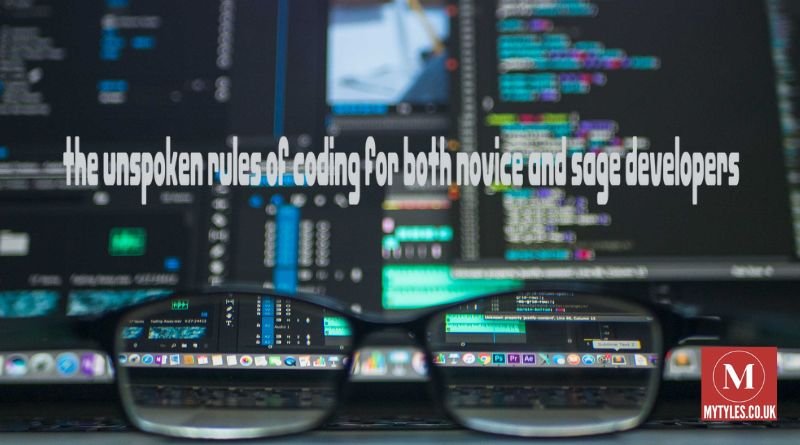Coding is more than stringing lines of code together; it’s a craft where technical proficiency meets a set of unspoken rules that shape the culture of the programming community. For both novice and experienced developers, these “rules” are as important as mastering any programming language. This guide dives into the unspoken rules of coding for both novice and sage developers, exploring principles that facilitate productive, clean, and collaborative code.
Understanding the Unspoken Code Etiquette
Learning to code is a journey that requires not only mastering syntax and logic but also understanding the etiquette that prevails in developer circles. Unlike traditional education, where formal rules are often clearly stated, coding culture operates with an underlying expectation of mutual respect, professionalism, and creativity. The principles that guide coding are learned through experience and through the observation of how seasoned developers approach challenges.
- Prioritize Readability Over Cleverness
A common mistake among novice developers is the assumption that complex or clever code equals better code. The reality, however, is quite the opposite. Code that’s easy to read is essential, especially in a collaborative environment where teams are constantly reviewing each other’s work. Sage developers know the importance of writing code that anyone—even a non-developer—could understand at a glance. This practice is essential not only for debugging but also for the long-term maintainability of code.
- Don’t Reinvent the Wheel—Leverage Libraries and Frameworks
Using existing libraries, frameworks, and open-source tools can significantly reduce development time. Inexperienced coders may fall into the trap of trying to create everything from scratch to demonstrate their capabilities. Yet, skilled developers understand that part of coding wisdom is knowing when to rely on existing resources and community contributions. There’s no shame in using a well-optimized tool or module; on the contrary, it’s often a mark of a seasoned coder who values efficiency and practicality.
- Embrace the Power of Documentation
Documenting code is often an afterthought, but it’s one of the most vital practices in coding. Both novices and veterans alike must cultivate the habit of commenting on their code and creating comprehensive documentation for any projects they work on. Clear documentation acts as a roadmap for future developers (or even for the original coder revisiting their work). When a developer understands the importance of documentation, they’ve reached a critical milestone in mastering the unspoken rules of coding.
- Code for Future Developers
Writing code with others in mind is essential. The way a developer structures code can either ease or obstruct future modifications. Following best practices, such as consistent naming conventions, modular code structures, and clear comments, makes the job easier for anyone who may work on the code in the future. Sage developers know that they are rarely the last person to touch the code, and therefore they code in a way that respects future developers.
- Seek Feedback Through Code Reviews
Code reviews are fundamental to improvement, but the value of feedback is sometimes overlooked by new developers. Experienced coders know the immense benefits of code reviews—they provide a chance to identify mistakes, learn new techniques, and refine one’s coding style. Code reviews also foster a culture of open communication and continuous learning, which is essential for any development team.
- Be Mindful of Code Performance
Efficiency in coding is about more than just making the code work; it’s about optimizing it to run effectively. New developers may write code that accomplishes the desired result without considering how resource-intensive it might be. By contrast, seasoned developers are aware of how algorithms and data structures affect performance and thus aim to write code that is both functional and optimized. Striking a balance between functionality and efficiency is a key aspect of the unspoken rules of coding for both novice and sage developers.
- Adopt a Problem-Solving Mindset
Coding is not just about syntax; it’s about solving problems. Skilled coders approach each coding challenge as a puzzle that requires patience, creativity, and critical thinking. Whether it’s debugging or optimizing, the ability to step back, analyze, and devise solutions is invaluable. This mindset is cultivated over time, as developers encounter a variety of problems and learn diverse approaches to solving them.
The Importance of Consistency and Discipline in Coding
Coding requires more than just an understanding of the technical aspects; it demands discipline and consistency. This rule isn’t always apparent at the start of a developer’s journey. Many novices might skip writing tests or neglect error handling, but these habits eventually become essential in a developer’s toolkit. Sage developers understand that consistent practices, like maintaining a uniform coding style and creating error-handling mechanisms, reduce the risk of bugs and improve code reliability.
- Write Testable Code
Writing code that is easy to test is a skill that separates professional-grade coders from beginners. Test-driven development (TDD), where tests are written before the actual code, has become an industry standard. This approach helps developers ensure that their code functions as expected and makes future maintenance much simpler. Developing a TDD mindset early on can make a significant difference in a coder’s growth and effectiveness.
- Use Version Control Wisely
Version control, such as Git, is fundamental in any professional coding environment. Beyond knowing how to commit, merge, and branch, there are best practices within version control itself that developers should follow. For instance, making regular commits with clear messages and avoiding large, unmanageable changes are habits that demonstrate a developer’s respect for their team and project. Experienced developers also know the importance of reverting to previous versions when necessary, an often-underappreciated skill.
- Maintain an Organized Folder Structure
An organized folder structure and file-naming convention are invaluable for large projects. They make it easier for other developers to understand the project’s architecture and reduce confusion during development. Clear project organization is a hallmark of experienced developers who understand the importance of ease of navigation within a codebase. For novices, learning to set up a structured folder system can be an early but important lesson in project management.
The Role of Community and Knowledge Sharing
A coder’s journey is never a solo endeavor. The community aspect of coding is one of the most defining traits of the field. Both novices and experienced developers can benefit from engaging with the community, whether by contributing to open-source projects, participating in forums, or sharing their knowledge through tutorials and blogs. Being a part of the coding community fosters a culture of growth, openness, and innovation.
- Contribute to Open Source
Open-source projects are a valuable resource for developers at all levels. They offer real-world coding experience, allow for collaboration with other developers, and provide an opportunity to learn from experienced coders. Open-source contributions are also a great way for novices to start building their portfolios, while seasoned developers can use them to give back to the community. Engaging with open-source projects embodies the unspoken principle of coding as a shared discipline.
- Never Stop Learning
Technology is in a state of constant evolution, and so too is the world of coding. Experienced developers know that continuous learning is not optional but necessary to stay relevant. Whether it’s learning a new programming language, understanding a new framework, or mastering advanced algorithms, lifelong learning is an unspoken rule every coder must adopt. Novice developers should strive to remain curious and explore different technologies to build a versatile skill set.
- Mentorship and Knowledge Sharing
The best developers are often those who take the time to mentor others and share their knowledge. Mentorship fosters a supportive environment, helps bridge the gap between novice and experienced developers, and contributes to the growth of the industry as a whole. Seasoned developers often find that mentoring newcomers reinforces their knowledge and enhances their skills, while novices benefit from the wisdom and guidance that experienced coders can provide.
Conclusion
The unspoken rules of coding for both novice and sage developers extend beyond syntax and structure; they embody a philosophy that values readability, collaboration, discipline, and continuous growth. For new developers, embracing these rules from the start can accelerate their journey to proficiency, while seasoned coders will find that these principles refine their practice and solidify their role within the developer community. As technology advances, these unspoken rules will continue to evolve, but their essence remains a guiding light for all who seek to master the art of coding.




